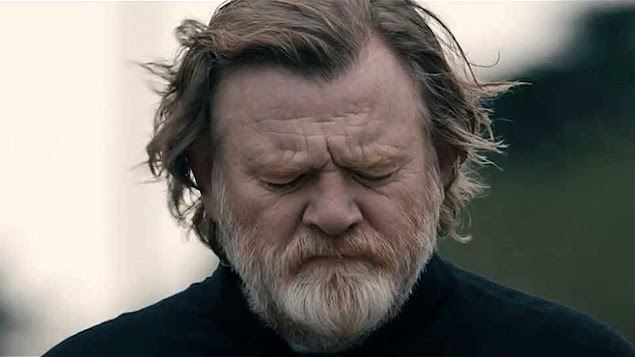Calvary
Spoilers?
You could deem 2014's CALVARY a "Christian" film, though such a label often describes insipid, one-dimensional filmed tracts that whitewash what the Christian life really is. A life that is lived within is as much as without. There is struggle, doubt, and frequent reconciliation with faith. Daily. Hourly. CALVARY is about a man who has dedicated his life to the Lord's work, but has not painted (or necessarily attempted to portray) himself as a saint. The townspeople, no less deep in their sin, see him differently. Possibly as someone who considers himself above human foible, irrevocably pious in his religion. A freak, maybe.
Or a co-conspirator. That's how the anonymous confessor, heard in the startling opening scene, feels about Father James (Brendan Gleeson, absolutely perfect). The distraught man recalls his sexual abuse at the hands of another priest many years earlier. He promises to kill Father James on the beach in one week. The would-be killer has justified the act as something positive, born out of some twisted moral imperative. A blow to the Catholic assembly that will have a positive impact, or at least send the "right" message to parishioners/congregants and church elders.
Later in the week, Father James' church burns down. Who among his village would carry out such a deed? Is it the same disgruntled former alter boy?
The town is filled with imperfect folks who regularly violate the Ten Commandments. Adulterers, wife abusers, drunks, rich men who would have trouble with that eye of the needle. They live in a picturesque hamlet off the Atlantic coast, but their souls' blackness belie the magnificent scenery. Writer/director John Michael McDonagh uses Larry Smith's impressive cinematography to make this point over and over. Father James pauses to admire the beauty, but his pause is one of resignation. Of one who has realized he has lost his (not necessarily "the") battle. One who has accepted his fate, hoping a legacy will endure.
Of what? Forgiveness, for one. That is the most obvious in McDonagh's film. Father James states late in the movie that it is quite underrated. The final scene sets the stage.
CALVARY is a highly effective examination of faith and the seeming futility of the Christian life. It is not a whodunnit, or even a "who will do it", at least not as its raison d'etre. The trailers may have made it appear that way. Rather, the film is a portrait of the loneliness of being steadfast. Of mission work. The village is the world at large. Observing his role when the Church has paid off plaintiff after plaintiff for decades of heinous secrecy becomes increasingly burdensome for the Father, a good man who does drink and cuss, and can be drawn to wrath just like the rest of 'em. But to the end, he clutches the promises. Despite the apathy of his congregation. Even as the darkness casts a mighty shroud.
My only complaint is CALVARY's tendency to feel more like a series of vignettes than a movie. Sometimes seemingly disconnected. There is an odd rhythm about it. Sometimes Chris Gill's editing is smooth, but often abandons a scene just when it is becoming interesting, or needs a satisfying resolution. Maybe a statement on Life?



Comments